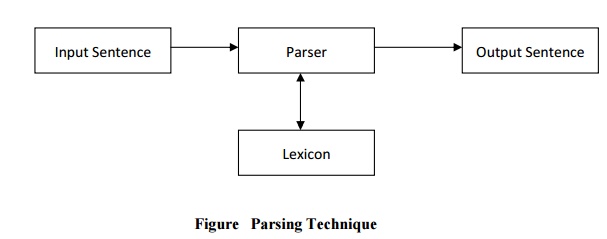Chapter: Artificial Intelligence
Parsing Process
PARSING PROCESS
Parsing is the term used to describe the process of automatically
building syntactic analysis of a sentence in terms of a given grammar and
lexicon. The resulting syntactic analysis may be used as input to a process of
semantic interpretation. Occasionally, parsing is also used to include both
syntactic and semantic analysis. The parsing process is done by the parser. The
parsing performs grouping and labeling of parts of a sentence in a way that
displays their relationships to each other in a proper way.
The parser is a computer program which accepts the natural language
sentence as input and generates an output structure suitable for analysis. The
lexicon is a dictionary of words where each word contains some syntactic, some
semantic and possibly some pragmatic information. The entry in the lexicon will
contain a root word and its various derivatives. The information in the lexicon
is needed to help determine the function and meanings of the words in a
sentence. The basic parsing technique is shown in figure .

Generally in computational linguistics the lexicon supplies paradigmatic
information about words including part of speech labels, irregular plurals and
sub categorization information for verbs. Traditionally, lexicons were quite
small and were constructed largely by hand. The additional information being
added to the lexicon increase the complexity of the lexicon. The organization
and entries of a lexicon will vary from one implementation to another but they
are usually made up of variable length data structures such as lists or records
arranged in alphabetical order. The word order may also be given in terms of
usage frequency so that frequently used words like “a”, “the” and “an” will
appear at the beginning of the list facilitating the search. The entries in a
lexicon could be grouped and given word category (by articles, nouns, pronouns,
verbs, adjectives, adverbs and so on) and all words contained within the
lexicon listed within the categories to which they belong. The entries are like
a, an (determiner), be (verb), boy, stick, glass (noun), green, yellow, red
(adjectives), I, we, you, he, she, they (pronouns) etc.
In most contemporary grammatical formalisms, the output of parsing is
something logically equivalent to a tree, displaying dominance and precedence
relations between constituents of a sentence. Parsing algorithms are usually
designed for classes of grammar rather than tailored towards individual
grammars.
Related Topics